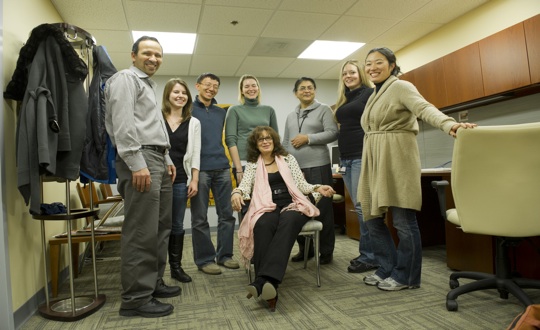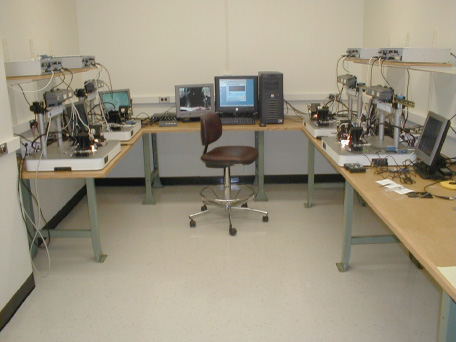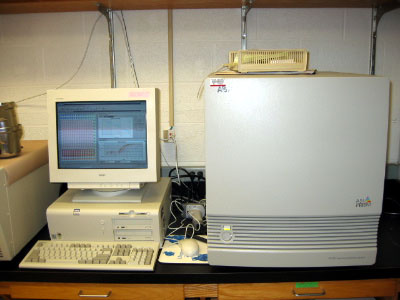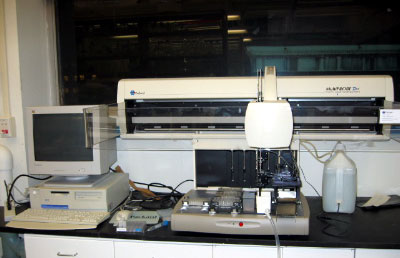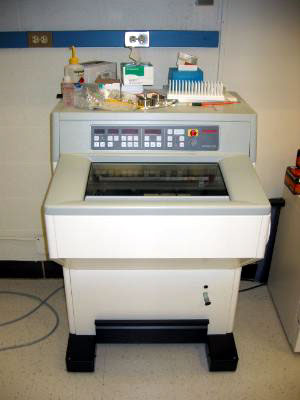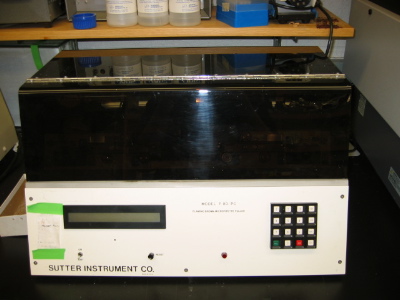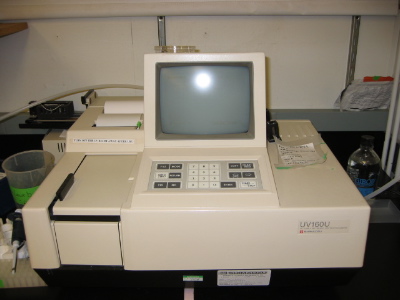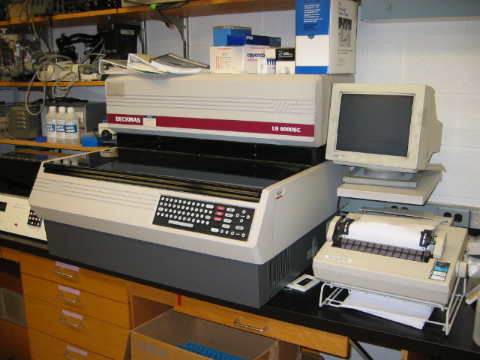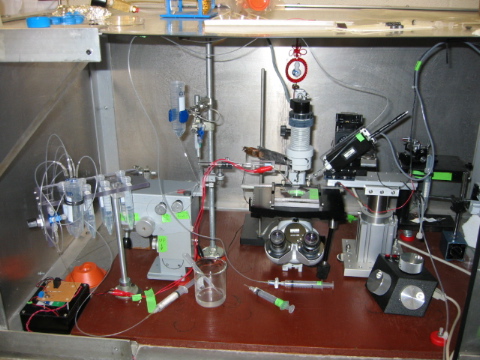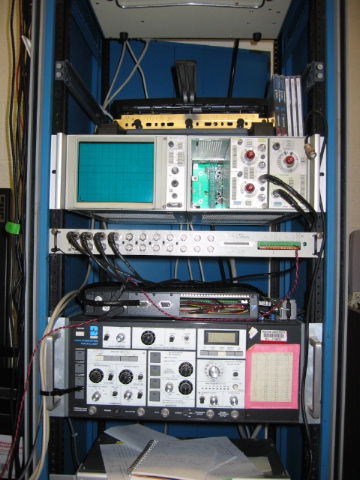Smith C, Martin SC, Sugunan K, Russek SJ, Gibbs TT, Farb DH. A role for picomolar concentrations of pregnenolone sulfate in synaptic activity-dependent Ca2+ signaling and CREB activation. Mol Pharmacol. 2014 Jul 23. pii: mol.114.094128. PMID: 25057049
Grabenstatter HL, Carlsen J, Raol YH, Yang T, Hund D, Cruz Del Angel Y, White AM, Gonzalez, MI, Longo, FM, Russek SJ, Brooks-Kayal, AR. Acute administration of the small-molecule p75NTR ligand does not prevent hippocampal neuron loss or development of spontaneous seizure after pilocarpine- induced status epilepticus. J Neurosci Res. 2014 May 7. doi: 10.1002/jnr.23402. PMID: 24801281
Grabenstatter HL, Del Angel YC, Carlsen J, Wempe MF, White AM, Cogswell M, Russek SJ, Brooks-Kayal AR. (2014) The effect of STAT3 inhibition on status epilepticus and subsequent spontaneous seizures in the pilocarpine model of acquired epilepsy. Neurobiol Dis. Feb;62:73-85.
Saha S, Hu, Martin SC, Bandyopadhyay S, Russek SJ, Farb DH (2013). Polycomblike protein PHF1b: a transcriptional sensor for GABA receptor activity. BMC Pharmacology and Toxicology August; 14(37).
Raible, D. J., Frey, L.C., Cruz Del Angel, Y., Russek, S. J. and Brooks-Kayal, A. R. (2012) GABA(A) receptor regulation after experimental traumatic brain injury. J. Neurotrauma. PMID: 22827467
Brooks-Kayal, A. R. and Russek, S. J. Regulation of GABA-A receptor gene expression and epilepsy. (2012) In: Jasper’s Basic Mechanisms of the Epilepsies. Fourth Edition. Noebels, J. L., Avoli, M., Rogawski, M. A., Olsen, R. W., and Delgado-Escueta, A. V., eds., Oxford University Press.
Kim, J.H., Roberts, D.S., Hu, Y., Lau, G,C., Brooks-Kayal, A.R., Farb, D.H., Russek, S.J. (2012) Brain-derived neurotrophic factors uses CREB and Egr3 to regulate NMDA receptor levels in cortical neurons. J. Neurochem. 120(2):210-219, PMID: 22035109
A. R. Brooks-Kayal, Y. Raol, and S. J. Russek. (2009) Alteration of Epileptogenesis Genes. Neurotherapeutics., (2), 312-8. PMID: 19332325
Lund IV, Hu Y, Yogendra SHR, Benham RS, Faris R, Russek SJ , Brooks-Kayal AR. BDNF Selectively Regulates GABAAA Receptor Transcription by Activation of the JAK/STAT Pathway. Science Signaling. 2008 October; 1(41): 1-14.
Hu Y, Russek SJ. BDNF and the diseased nervous system: a delicate balance between adaptive and pathological processes of gene regulation. J Neurochem. 2008 Apr; 105(1): 1-17. Epub 2008 Jan 18. Review.
Hu Y, Lund IV, Gravielle MC, Farb DH, Brooks-Kayal AR, Russek SJ. Surface expression of GABA (A) receptors is transcriptionally controlled by the interplay of CREB and its binding partner ICER. J Biol Chem. 2008 Apr 4; 283(14):9328-40. Epub 2008 Jan 7.
Mark KA, Quinton MS, Russek SJ, Yamamoto BK. Dynamic changes in vesicular glutamate transporter 1 function and expression related to methamphetamine-induced glutamate release. J Neurosci. 2007 Jun 20;27(25):6823-31.
Reddy TE, Shakhnovich BE, Roberts DS, Russek SJ, DeLisi C.. Positional clustering improves computational binding site detection and identifies novel cis-regulatory sites in mammalian GABAA receptor subunit genes. Nucleic Acids Res. 2007;35(3):e20. Epub 2007 Jan 3.
Raol YH, Lund IV, Bandyopadhyay S, Zhang G, Roberts DS, Wolfe JH, Russek SJ, Brooks-Kayal AR. Enhancing GABA(A) receptor alpha 1 subunit levels in hippocampal dentate gyrus inhibits epilepsy development in an animal model of temporal lobe epilepsy. J Neurosci. 2006 Nov 1;26(44):11342-6.
Gibbs TT, Russek SJ, Farb DH Sulfated steroids as endogenous neuromodulators. Pharmacol Biochem Behav. 2006 Aug;84(4):555-67. Epub 2006 Oct 4. Review.
Popik P, Kostakis E, Krawczyk M, Nowak G, Szewczyk B, Krieter P, Chen Z, Russek SJ, Gibbs TT, Farb DH, Skolnick P, Lippa AS, Basile AS. The anxioselective agent 7-(2-chloropyridin-4-yl)pyrazolo-[1,5-a]-pyrimidin-3-yl](pyridin-2-yl)methanone (DOV 51892) is more efficacious than diazepam at enhancing GABA-gated currents at alpha1 subunit-containing GABAA receptors. J Pharmacol Exp Ther. 2006 Dec;319(3):1244-52. Epub 2006 Sep 13.
Roberts DS, Hu Y, Lund IV, Brooks-Kayal AR, Russek SJ. Brain-derived neurotrophic factor (BDNF)-induced synthesis of early growth response factor 3 (Egr3) controls the levels of type A GABA receptor alpha 4 subunits in hippocampal neurons. J Biol Chem. 2006 Oct 6;281(40):29431-5. Epub 2006 Aug 10.
Roberts DS, Raol YH, Bandyopadhyay S, Lund IV, Budreck EC, Passini MJ, Wolfe JH, Brooks-Kayal AR, Russek SJ. (2005) Egr3 stimulation of GABRA4 promoter activity as a mechanism for seizure-induced up-regulation of GABAA receptor {alpha}4 subunit expression. Proc Natl Acad Sci U S A. 2005 Aug 16;102(33):11894-9. Epub 2005 Aug 9. [Abstract ]
Lippa A, Czobor P, Stark J, Beer B, Kostakis E, Gravielle M, Bandyopadhyay S, Russek SJ, Gibbs TT, Farb DH, Skolnick P. (2005) Selective anxiolysis produced by ocinaplon, a GABA(A) receptor modulator. Proc Natl Acad Sci U S A. 2005 May 17;102(20):7380-5. Epub 2005 May 3. [ Abstract ]
Gravielle MC, Faris R, Russek SJ, Farb DH. (2005) GABA induces activity dependent delayed-onset uncoupling of GABA/benzodiazepine site interactions in neocortical neurons. J Biol Chem. 2005 Jun 3;280(22):20954-60. Epub 2005 Apr 1. [ Abstract ]
Steiger JL, Bandyopadhyay S, Farb DH, Russek SJ. (2004) cAMP response element-binding protein, activating transcription factor-4, and upstream stimulatory factor differentially control hippocampal GABABR1a and GABABR1b subunit gene expression through alternative promoters. J Neurosci. 2004 Jul 7;24(27):6115-26. [ Abstract ]
Jang MK, Mierke DF, Russek SJ, Farb DH. (2004) A steroid modulatory domain on NR2B controls N-methyl-D-aspartate receptor proton sensitivity. Proc Natl Acad Sci U S A. 2004 May 25;101(21):8198-203. Epub 2004 May 18. [ Abstract ]
Martin SC, Steiger JL, Gravielle MC, Lyons HR, Russek SJ, Farb DH. (2004) Differential expression of gamma-aminobutyric acid type B receptor subunit mRNAs in the developing nervous system and receptor coupling to adenylyl cyclase in embryonic neurons. J Comp Neurol. 2004 May 17;473(1):16-29. [ Abstract ]
Steiger JL, Russek SJ. (2004) GABAA receptors: building the bridge between subunit mRNAs, their promoters, and cognate transcription factors. Pharmacol Ther. 2004 Mar;101(3):259-81. Review. Erratum in: Pharmacol Ther. 2004 Sep;103(3):261. [ Abstract ]
Lau GC, Saha S, Faris R, Russek SJ. (2004) Up-regulation of NMDAR1 subunit gene expression in cortical neurons via a PKA-dependent pathway. J Neurochem. 2004 Feb;88(3):564-75. [ Abstract ]
Steiger JL, Alexander MJ, Galler JR, Farb DH, Russek SJ. (2003) Effects of prenatal malnutrition on GABAA receptor alpha1, alpha3 and beta2 mRNA levels. Neuroreport. 2003 Sep 15;14(13):1731-5. [ Abstract ]
Steiger JL, Galler JR, Farb DH, Russek SJ. (2002) Prenatal protein malnutrition reduces beta(2), beta(3) and gamma(2L) GABA(A) receptor subunit mRNAs in the adult septum. Eur J Pharmacol. 2002 Jun 20;446(1-3):201-2. [ Abstract ]
Martin SC, Russek SJ, Farb DH. (2001) Human GABA(B)R genomic structure: evidence for splice variants in GABA(B)R1 but not GABA(B)R2. Gene. 2001 Oct 31;278(1-2):63-79. [ Abstract ]
Russek SJ, Bandyopadhyay S, Farb DH. (2000) An initiator element mediates autologous downregulation of the human type A gamma -aminobutyric acid receptor beta 1 subunit gene. Proc Natl Acad Sci U S A. 2000 Jul 18;97(15):8600-5. [ Abstract ]
McLean PJ, Shpektor D, Bandyopadhyay S, Russek SJ, Farb DH. (2000) A minimal promoter for the GABA(A) receptor alpha6-subunit gene controls tissue specificity. J Neurochem. 2000 May;74(5):1858-69. [ Abstract ]
Martin SC, Russek SJ, Farb DH. (1999) Molecular identification of the human GABABR2: cell surface expression and coupling to adenylyl cyclase in the absence of GABABR1. Mol Cell Neurosci. 1999 Mar;13(3):180-91. [ Abstract ]
Russek SJ. (1999) Evolution of GABA(A) receptor diversity in the human genome. Gene. 1999 Feb 18;227(2):213-22. [ Abstract ]
Yaghoubi N, Malayev A, Russek SJ, Gibbs TT, Farb DH. (1998) Neurosteroid modulation of recombinant ionotropic glutamate receptors. Brain Res. 1998 Aug 24;803(1-2):153-60. [ Abstract ]
Rabow LE, Russek SJ, Farb DH. (1995) From ion currents to genomic analysis: recent advances in GABAA receptor research. Synapse. 1995 Nov;21(3):189-274. Review. [ Abstract ]
McLean PJ, Farb DH, Russek SJ. (1995) Mapping of the alpha 4 subunit gene (GABRA4) to human chromosome 4 defines an alpha 2-alpha 4-beta 1-gamma 1 gene cluster: further evidence that modern GABAA receptor gene clusters are derived from an ancestral cluster. Genomics. 1995 Apr 10;26(3):580-6. [ Abstract ]
Russek SJ, Farb DH. (1995) Mapping of the beta 2 subunit gene of the GABAA receptor (GABRB2) to human chromosome 5q34 using fluorescence in situ hybridization. Cell Mol Biol Res. 1995;41(6):511-3. No abstract available. [ Abstract ]
Russek SJ, Farb DH. (1995) Mapping of the beta 2 subunit gene (GABRB2) to microdissected human chromosome 5q34-q35 defines a gene cluster for the most abundant GABAA receptor isoform. Genomics. 1994 Oct;23(3):528-33. [ Abstract ]
Farb, D. H., T.T. Gibbs, F.-S. Wu, M. Gyenes, L. Friedman and S.J. Russek (1992) Steroid Modulation of Amino Acid Receptors. In: Advances in Biochemical Psychopharmacology, V. 47: GABAergic Synaptic Transmission: Molecular, Pharmacological, and Clinical Aspects (G. Biggio, A. Concas, and E. Costa, eds.), pp. 119-131, Raven Press, New York.
Russek SJ, Quirk JC, Farb DH. (1993) Restriction selection cloning: a simple general method for the selection of recombinant DNA. Cell Mol Biol Res. 1993;39(2):177-82. [ Abstract ]
Farb DH, Gibbs TT, Wu FS, Gyenes M, Friedman L, Russek SJ. (1992) Steroid modulation of amino acid neurotransmitter receptors. Adv Biochem Psychopharmacol. 1992;47:119-31. No abstract available. [ Abstract ]
Russek LG, King SH, Russek SJ, Russek HI. (1990) The Harvard Mastery of Stress Study 35-year follow-up: prognostic significance of patterns of psychophysiological arousal and adaptation. Psychosom Med. 1990 May-Jun;52(3):271-85. [ Abstract ]
Publication Search via PubMed
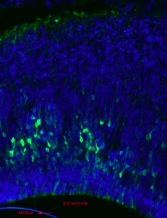 What tools do we use?
What tools do we use? Our studies involve the use of primary cultured neurons from different regions of the brain that are manipulated to test hypotheses of signal transduction which are tested in vivo using viral delivery into adult animals, or in developing embryos, via electroporation of multiple DNA vectors and silencing RNA molecules. Laser capture microdissection (LCM) allows us to purify neuronal and glial populations from behavioral models of epilepsy, in collaboration with our colleague Amy Brooks-Kayal at University of Colorado. In partnership with our BU colleagues (David Farb and Valentina Sabino) we use transcriptomic and genomic tools (single nuclei sequencing, ChIP-sequencing, and spatial transcriptomics) to identify markers of aberrant intracellular signaling that may be relevant to Alzheimer’s disease and mood disorders, respectively. Taken together, these tools allow us to test the ability of genetic manipulation to prevent the onset of chronic disorders based on the results of our open discovery approaches and interdisciplinary partnership across laboratories.
Our studies involve the use of primary cultured neurons from different regions of the brain that are manipulated to test hypotheses of signal transduction which are tested in vivo using viral delivery into adult animals, or in developing embryos, via electroporation of multiple DNA vectors and silencing RNA molecules. Laser capture microdissection (LCM) allows us to purify neuronal and glial populations from behavioral models of epilepsy, in collaboration with our colleague Amy Brooks-Kayal at University of Colorado. In partnership with our BU colleagues (David Farb and Valentina Sabino) we use transcriptomic and genomic tools (single nuclei sequencing, ChIP-sequencing, and spatial transcriptomics) to identify markers of aberrant intracellular signaling that may be relevant to Alzheimer’s disease and mood disorders, respectively. Taken together, these tools allow us to test the ability of genetic manipulation to prevent the onset of chronic disorders based on the results of our open discovery approaches and interdisciplinary partnership across laboratories.